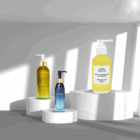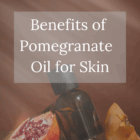Table of Contents:
TL/DR: Which One Should You Pick?
Retinol vs Bakuchiol: What Sets Them Apart?
How to Choose the Right One?
Bakuchiol vs Tretinoin
Comparison Table: Bakuchiol vs Retinol vs Tretinoin
Frequently Asked Questions
Our Top Picks
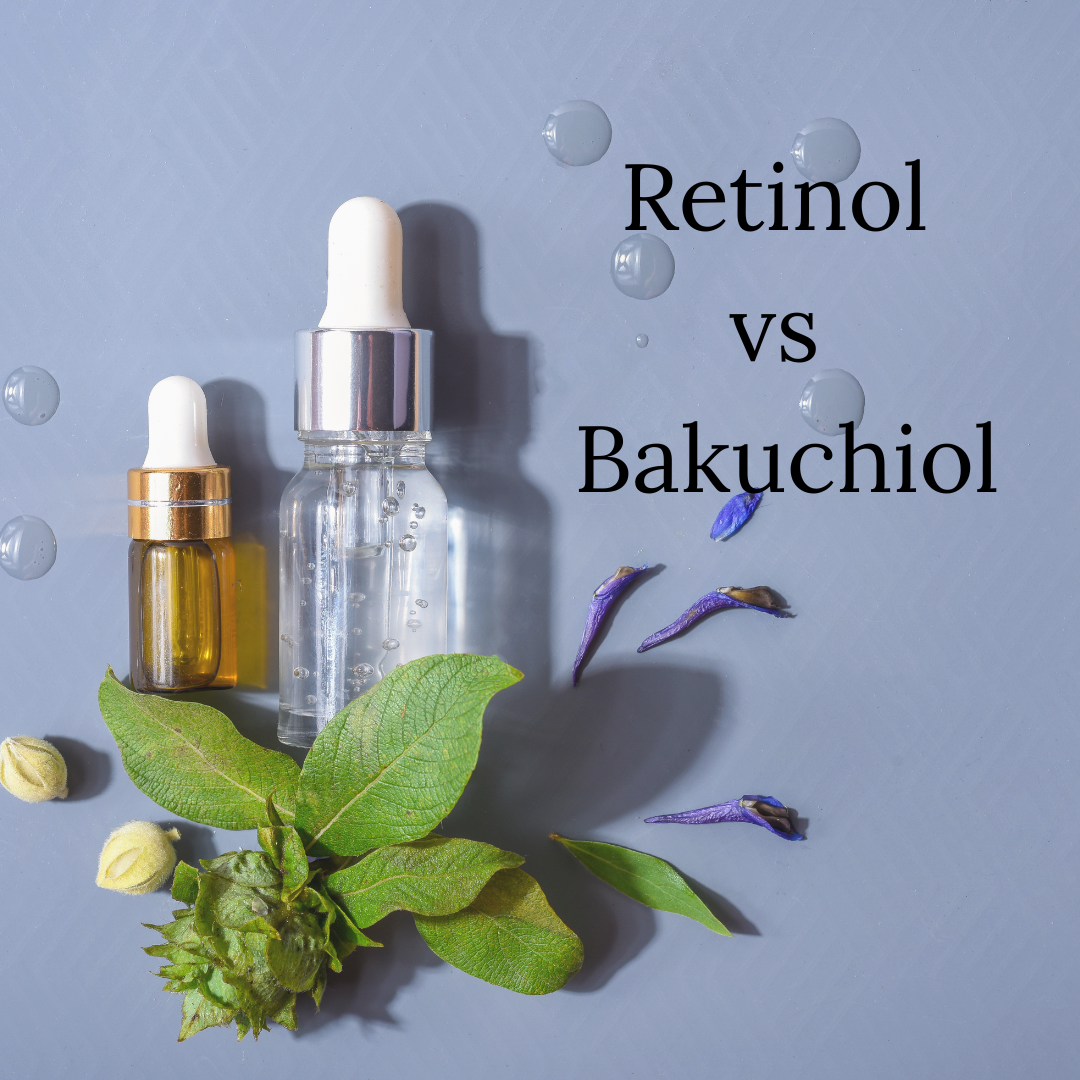
Is bakuchiol really the gentle, natural alternative to retinol, or is it overhyped?
I’ve written a lot about bakuchiol as an ingredient and also explored the common reasons why people give up on retinoids. While retinoids are undeniably effective, it’s time to take a closer look and compare the two side by side.
If retinoids are off the table for you, chances are you’ve been searching for a reliable bakuchiol serum. There are many ways to address concerns like wrinkles and acne, and bakuchiol is quickly becoming a popular choice for good reason.
But when it comes to performance, which ingredient delivers better results — bakuchiol or retinol?
TL/DR: Which One Should You Pick?
Which is better- Bakuchiol vs Retinol? The truth is: it depends.
| What worked for me: | But for you? |
| I have seen excellent outcomes from using Bakuchiol and have had no negative side effects, unlike retinol, which I cannot tolerate. Even if retinol is deemed significantly more effective, it is not a viable option for me. | Choosing the right product will depend on several aspects: – Retail preferences – Skin sensitivity – Skincare goals Bakuchiol is backed by growing research, and many studies show similar benefits to retinol. Still, retinol has a longer history of clinical success and stronger data when it comes to fine lines and aging. |
Retinol vs Bakuchiol: What Sets Them Apart?
I’ll be honest, I’m a big fan of bakuchiol. Still, I recognize that bakuchiol and retinol each have their own strengths. To keep this review as fair as possible, I asked AI to provide an unbiased comparison of the two ingredients. From there, I evaluated each category and shared which one came out on top.
- Ingredient Source– Bakuchiol is a natural ingredient, sourced from the Psoralea corylifolia plant. Retinoids, on the other hand, are either synthesized in labs or derived from Vitamin A. There’s no clear winner here. It really depends on whether you prefer plant-based skincare or are comfortable with scientifically formulated ingredients.
- Skin Sensitivity– Retinoids are known to cause dryness, redness, and flaking, especially during the initial stages of use or when applied in strong doses. Bakuchiol, in contrast, is much gentler on the skin and typically doesn’t trigger irritation, making it a friendlier option for those with sensitive or reactive skin. Winner: Bakuchiol takes this one for its soothing, non-irritating nature.
- Antioxidant Properties– Both retinoids and bakuchiol provide antioxidant support, helping to protect the skin from environmental stress. Bakuchiol offers additional benefits as it also has anti-inflammatory and antibacterial properties. These extra qualities make it especially helpful for sensitive or acne-prone skin. Winner: Bakuchiol, for its well-rounded protective and calming effects.
- How They Work– Retinoids activate retinoic acid receptors in the skin, which leads to faster cell turnover and increased collagen production. Bakuchiol interacts with similar pathways but does so in a different, gentler way at the cellular level. Winner: This depends on your skin’s needs. If you want maximum strength and can handle it, retinoids may be more effective. If you prefer a gentle approach, bakuchiol is the better choice.
- Sun Sensitivity– Retinoids can make your skin more vulnerable to sun exposure, increasing the risk of sunburn if you skip sunscreen. Bakuchiol does not have this effect and can be used both day and night without added sensitivity. Winner: Bakuchiol
- Eye Dryness– Some people experience eye dryness due to retinol-related meibomian gland dysfunction. This side effect has not been reported with bakuchiol. Although this condition is usually not permanent, it is always best to speak to a dermatologist before using retinoids, especially if you have had this issue before. Winner: Bakuchiol
- Acne Flare-Ups– Retinol can sometimes lead to an initial breakout period known as purging, which happens as the skin speeds up its turnover. Bakuchiol does not typically cause this effect, making it a smoother option for those concerned about breakouts. Winner: Bakuchiol
- Pregnancy- Topical retinoids, especially prescription ones like retinoic acid, should be avoided during pregnancy. Bakuchiol is a safer alternative. Winner: Bakuchiol
- Compatibility with Other Skincare Ingredients- Some ingredients, like benzoyl peroxide, can reduce retinoid effectiveness, and retinol shouldn’t be used with Vitamin C or hydroxy acids. Bakuchiol is more compatible with other products. Winner: Bakuchiol
- Research and Proven Efficacy- Retinoids are well-studied and effective for various skin concerns, while early research on bakuchiol is promising but not as established. Both are similar, but retinoids overall are superior.
- Availability and Cost- Retinoids come in over-the-counter (like retinol) and prescription forms. Bakuchiol, although available over the counter, is often more expensive as a niche product. Winner: Retinol
How to Choose the Right One?
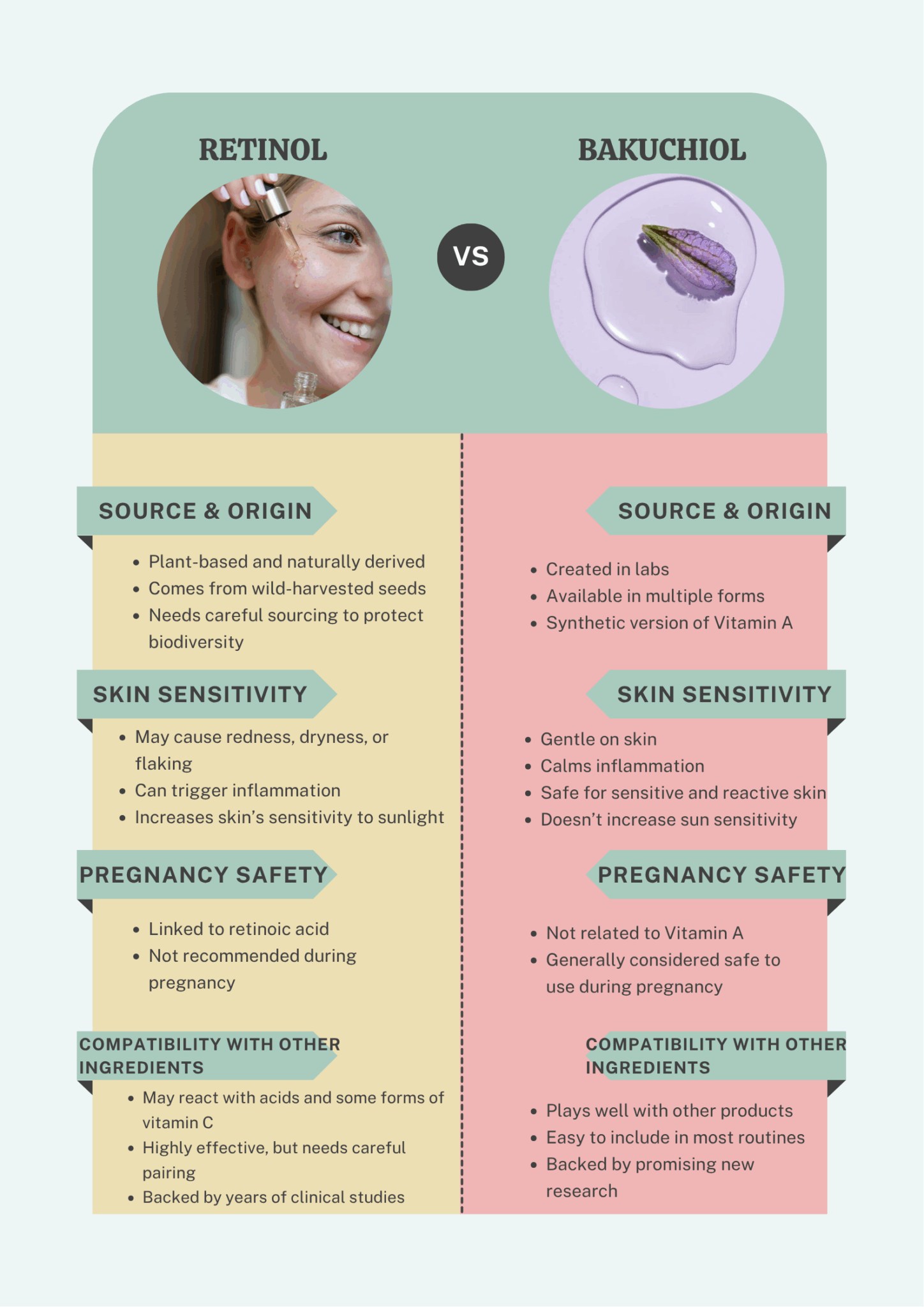
Recent studies comparing bakuchiol and retinol directly at equal concentrations (0.5%) found that bakuchiol delivers similar results to retinol.
This suggests that you’re likely to see visible improvements no matter which one you decide to include in your routine.
Structurally and chemically, bakuchiol is classified as a meroterpene phenol. Despite offering effects that resemble those of retinol, such as improving collagen production and balancing melanin, its molecular structure is entirely different.
Because they interact with the skin differently on a cellular level, it explains why bakuchiol tends to be gentler and has fewer side effects compared to retinol.
Many people wonder if bakuchiol is better than retinol.
Based on the available research, bakuchiol appears to be comparable to retinol in its effects, but not necessarily more effective. For individuals who either cannot tolerate retinol or choose not to use it, bakuchiol may feel like a better fit.
It’s also important to note that there is no existing data that directly compares bakuchiol with stronger prescription retinoids. When we look at the broader picture of long-term results, retinoids as a category are likely more effective. After all, clinical data on retinoids has been building since the early 1980s.
Still, choosing the right ingredient goes beyond results alone. Effectiveness is only part of the equation. If a product leads to irritation or compromises the skin barrier, it may not be the right choice for you. That is why gentler alternatives like bakuchiol have become such a valuable part of modern skincare routines.
Bakuchiol vs Tretinoin– Is it an Alternative?
Tretinoin is a well-established prescription-strength retinoid, known for its proven ability to treat acne, smooth fine lines, and improve signs of sun damage. It works by speeding up skin cell renewal and encouraging collagen production. While the results can be impressive, it often comes with side effects like redness, dryness, flaking, and sensitivity to sunlight, especially during the initial months of use.
If you find regular over-the-counter retinol too intense, tretinoin is like an even stronger version with a reputation for being much harsher.
Bakuchiol, in contrast, is a gentle, plant-based option that delivers many of the same skin-enhancing benefits. It can help improve texture, soften fine lines, and boost firmness, all while being much easier on the skin and far less likely to irritate.
So, is bakuchiol just as effective as tretinoin?
That’s still uncertain. No direct studies have compared the two so far. Most of the research on bakuchiol has only looked at how it performs next to standard retinol.
Tretinoin remains the gold standard in dermatology for treating signs of aging and acne. However, for those with sensitive skin, concerns during pregnancy, or a preference for gentler, plant-based options, bakuchiol stands out as a promising alternative.
If you’ve tried tretinoin in the past and found it too harsh, bakuchiol might be the gentler solution your skin has been waiting for.
Comparison Table: Bakuchiol vs Retinol vs Tretinoin
| Factor | Bakuchiol | Retinol | Tretinoin |
| Irritation Risk | Very Low | Moderate | High |
| Sun Sensitivity | None | Yes | Yes |
| Prescription Required | No | No | Yes |
| Safe in Pregnancy | Yes | Controversial | No |
| Evidence Base | Moderate | High | Very High |
Frequently Asked Questions
1. How does bakuchiol compare to retinol?
Bakuchiol and retinol offer many of the same skincare benefits. Both help reduce the appearance of fine lines, improve skin texture, and support collagen production. The main difference lies in how your skin reacts to them. Bakuchiol is much gentler, which makes it a great choice for those who find retinoids too harsh.
Here’s how they differ:
Strong evidence supports retinol’s anti-aging effects, but it often causes side effects like redness, flaking, and increased sun sensitivity.
Bakuchiol is a plant-derived alternative that delivers similar results without causing irritation or making your skin more sensitive to sunlight.
2. Is bakuchiol better than retinol?
This depends on your skin type and what you want to achieve. If your skin handles retinol well, you can benefit from its well-researched effects on aging and acne. But if you have sensitive skin, experience irritation easily, or prefer plant-based alternatives, bakuchiol may be the better choice.
For many people, retinoids can cause redness, peeling, or are not allowed during pregnancy—this is where bakuchiol is helpful.
3. Does bakuchiol have any side effects?
Bakuchiol is a botanical compound often viewed as a gentler alternative to retinol in skincare. It is generally well-tolerated by various skin types; however, individual reactions can vary. It is advisable to conduct a patch test to reduce the risk of irritation.
Bakuchiol rarely causes side effects like peeling, dryness, or sun sensitivity, unlike retinol. This makes it a preferred choice for those looking for effective anti-aging results without the usual discomfort.
4. Can Retinol or Bakuchiol Cause Eye Dryness?
Retinol can sometimes lead to dryness and irritation around the eyes. This happens because retinoids may interfere with the function of the meibomian glands, which are responsible for producing the oils that keep your eyes comfortably lubricated. In some cases, this can contribute to dry eye symptoms or increased sensitivity in that area.
What about bakuchiol?
Bakuchiol does not affect oil production in the same way as retinol and is not known to cause eye dryness. For those with sensitive eyes or a tendency toward dryness, bakuchiol may be a gentler option for smoothing fine lines and wrinkles near the eye area.
5. How long does bakuchiol take to show results?
Bakuchiol delivers results gradually and, just like retinol, it needs regular use to be effective.
📆 After 4 to 6 weeks: You may notice smoother skin texture and improved hydration.
📆 After 8 to 12 weeks: Fine lines, wrinkles, and uneven tone may start to fade.
📆 After 3 months and beyond: Continued use can support long-term improvements in signs of aging and help prevent breakouts.
Because bakuchiol is gentle on the skin, most people can start using it daily right away, unlike retinol, which often needs to be introduced slowly due to potential irritation.
6. Is bakuchiol better than retinol for acne?
Retinol is widely recognized as a top treatment for acne. It helps clear pores, promotes faster skin renewal, and improves overall skin texture. However, it can also cause dryness, irritation, and an initial purging phase, which makes it difficult for some people to stick with.
Bakuchiol provides a gentler alternative for those with acne-prone or sensitive skin.
✔ Its anti-inflammatory and antibacterial properties may help calm active breakouts.
✔ It does not trigger a purging phase, so you can avoid that initial flare-up.
✔ Sensitive skin that reacts to retinoids generally tolerates it better.
While bakuchiol may not fully replace prescription-strength options like tretinoin, it can be a valuable choice for those seeking clearer skin without harsh side effects.
Our Top Picks
1. MODEL OFF DUTY BEAUTY
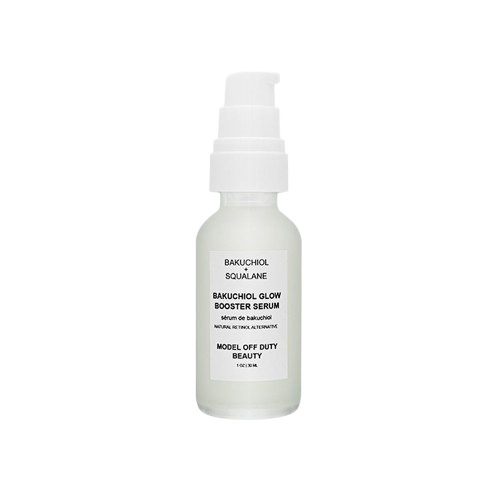
Model Off Duty Beauty Bakuchiol Glow Booster Serum ($48) size: 1 oz
Natural Retinol alternative serum. Better than retinol, because Bakuchiol is natural and a lot more gentle. It helps to boost collagen and elastin production and reduce fine lines and wrinkles.
2. HERBIVORE
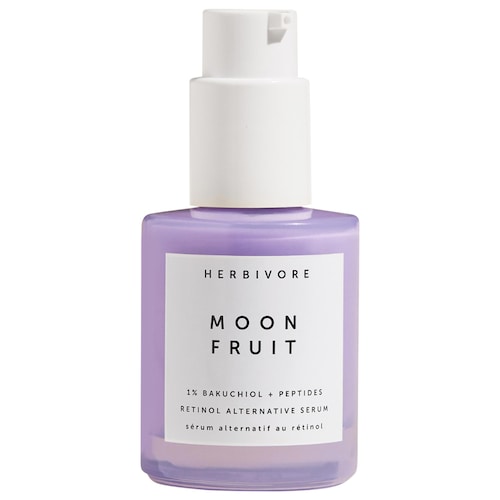
Herbivore Moon Fruit 1% Bakuchiol + Peptides Retinol Alternative Serum ($68) size: 1 oz
Experience the power of plants in this retinol alternative serum. One percent bakuchiol and peptides dramatically improve the appearance of fine lines and wrinkles, visibly firm, and clear the look of skin as effectively as a retinol without the irritating dryness or redness.
3. KORA ORGANICS
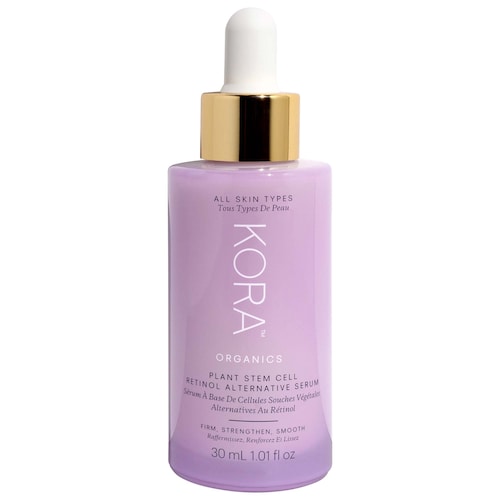
KORA Organics Plant Stem Cell Retinol Alternative Firming Serum ($79) size: 1 oz
Made with five times the active strength of retinol but gentle enough to use day and night, this milky, certified-organic serum blends bakuchiol and alfalfa extract with antioxidant-rich açai-plant stem cells, rosehip, and noni fruit for 24/7 support against visible signs of aging without irritation.
4. PAULA’S CHOICE
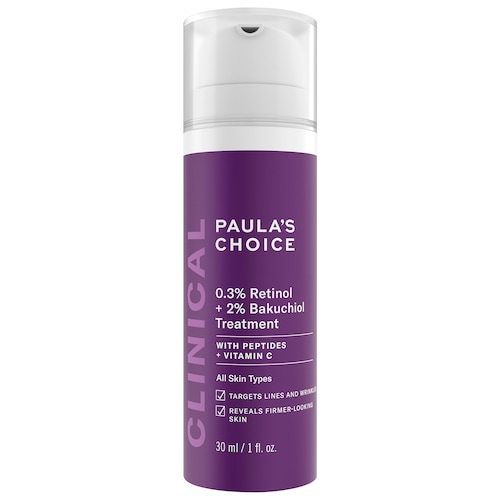
Paula’s Choice Clinical 0.3% Retinol + 2% Bakuchiol Treatment ($65) size: 1 oz
These potent ingredients enhance one another and deliver multilevel support and nourishment. It quickly targets visible signs of aging for a fresh, youthful-looking complexion.
5. ALPYN
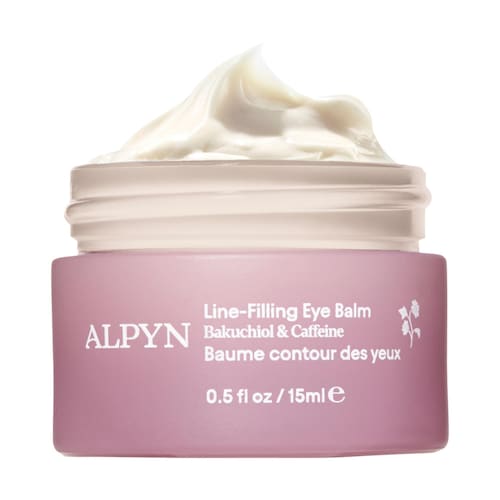
ALPYN Line-Filling Eye Cream with Bakuchiol and Caffeine ($62) size: 0.5 oz
This innovative eye cream applies like a cream but behaves like a balm, quickly improving the appearance of fine lines for a visibly smoother under-eye area.
6. MODEL OFF DUTY BEAUTY
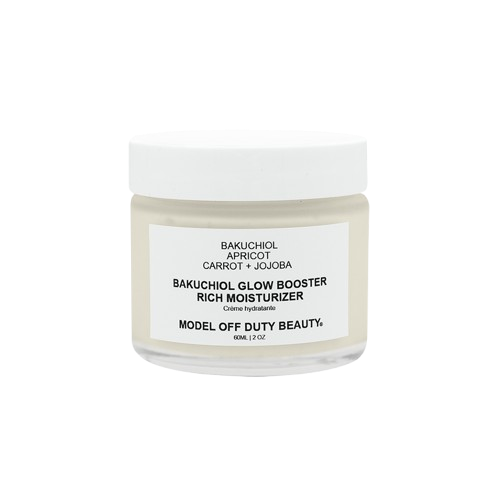
Model Off Duty Beauty Bakuchiol Glow Booster Moisturizer ($56) size: 2 oz
Bakuchiol Glow Booster Rich Moisturizer is a skincare essential that combines the power of bakuchiol with rich hydration for a radiant complexion. Bakuchiol, a natural alternative to retinol, supports skin renewal, reducing the appearance of fine lines and wrinkles.
